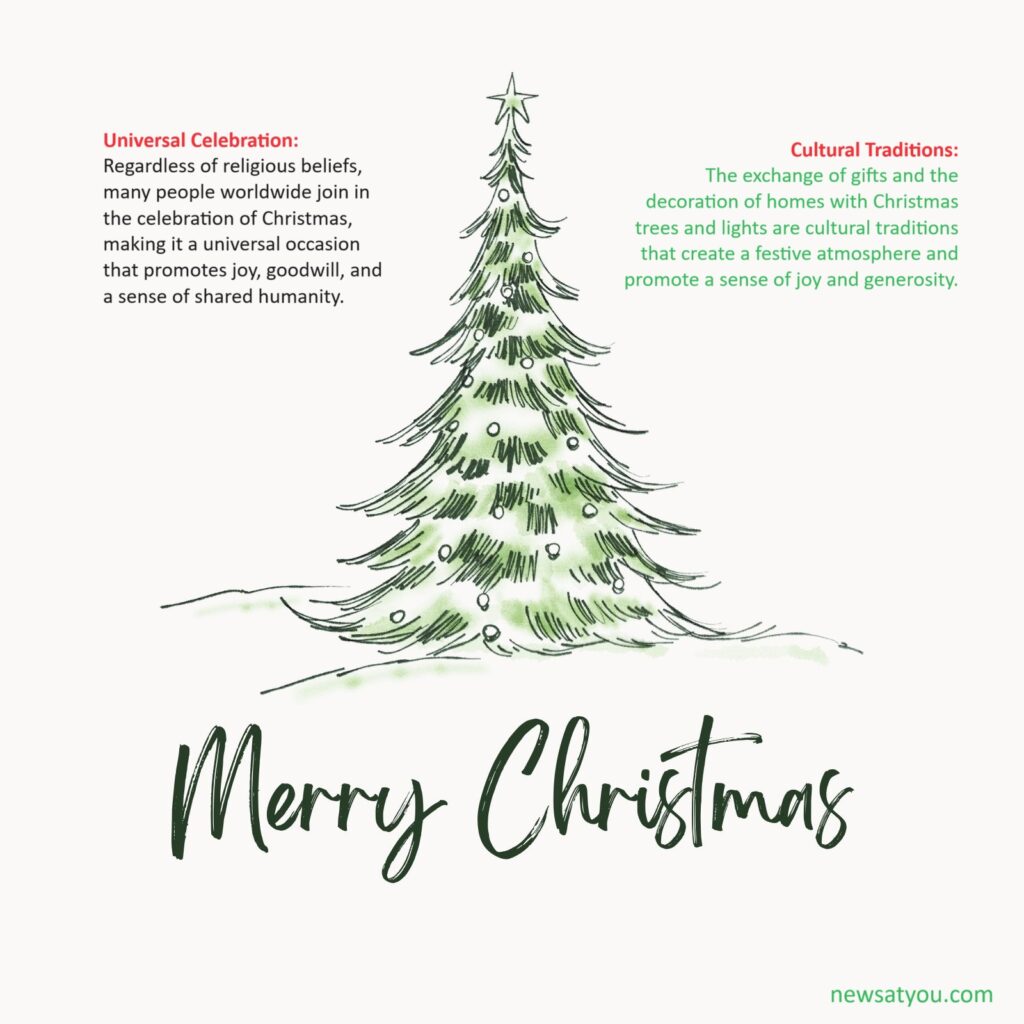Christmas Day(December 25) is celebrated by millions of people around the world and holds significant cultural, religious, and social importance. Here are some key aspects that highlight the importance of Christmas Day celebration:

- Religious Significance:
- Christian Celebration: Christmas is primarily a Christian holiday that commemorates the birth of Jesus Christ. For Christians, it is a time to celebrate the incarnation of God’s son and the fulfillment of prophecies in the Bible.
- Religious Traditions: Churches hold special services, such as Midnight Mass, to mark the occasion. These services often include prayers, hymns, and readings from the Bible.
- Cultural Traditions:
- Gift-Giving: Exchanging gifts is a central part of Christmas tradition, symbolizing the gifts given to the baby Jesus by the Magi. This tradition fosters a sense of generosity and goodwill.
- Decorations: The use of decorations, such as Christmas trees, lights, and ornaments, is a cultural tradition that adds to the festive atmosphere and brings joy to communities.
- Family and Social Gatherings:
- Reunion and Bonding: Christmas is a time when family and friends come together. It provides an opportunity for people to reunite, share meals, and strengthen their bonds. Many people travel long distances to be with their loved ones during this season.
- Community Spirit: Christmas fosters a sense of community as people participate in local events, parades, and charitable activities aimed at helping those in need.
- Festive Atmosphere:
- Music and Carols: Christmas music and carols contribute to the festive atmosphere. Singing traditional songs and carols is a popular way to celebrate and spread joy.
- Festive Foods: Special meals and treats are prepared during Christmas, adding to the overall festive experience. Traditional foods and drinks vary by culture but often include special dishes reserved for this time of the year.
- Symbolism of Light:
- Candles and Lights: The use of candles and lights symbolizes the light of Christ and is a metaphor for hope and renewal. Many cultures incorporate lighting ceremonies into their Christmas celebrations.
- Reflection and Gratitude:
- Year-End Reflection: Christmas falls at the end of the calendar year, prompting people to reflect on the past year’s experiences, express gratitude for blessings, and set positive intentions for the coming year.
- Commercial and Economic Impact:
- Shopping and Sales: Christmas is a peak season for retail and commerce. The tradition of gift-giving contributes significantly to the economy, with businesses offering special promotions and sales during the holiday season.
In summary, Christmas Day is celebrated for its religious significance, cultural traditions, emphasis on family and community, festive atmosphere, and the symbolic meaning of light and hope. It brings people together, fosters goodwill, and provides a time for reflection and celebration
History of Christmas day:
- Early Christian Origins: The celebration of Christmas has its roots in the early Christian church, with the date chosen to coincide with pagan winter solstice festivals to ease conversion efforts.
- Date Controversy: The exact birth date of Jesus is unknown, and December 25th was adopted as Christmas Day by the Western Christian Church in the 4th century, likely to replace pagan festivities with a Christian observance.
- Medieval Celebrations: Christmas celebrations in medieval Europe included feasts, caroling, and the display of nativity scenes, with the focus on religious significance.
- Puritan Suppression: In the 17th century, the Puritans in England and later in America disapproved of Christmas, considering it a pagan-influenced celebration, and suppressed its observance.
- Victorian Revival: The Victorian era in the 19th century saw a revival of Christmas traditions, influenced by writers like Charles Dickens, who emphasized family, generosity, and goodwill.
- Modern Customs: Many modern Christmas customs, such as the Christmas tree, Santa Claus, and gift-giving, have evolved from a blend of European traditions and cultural influences over the centuries.
- Globalization of Traditions: The celebration of Christmas spread globally through European colonialism and later globalization, adapting to and incorporating diverse cultural practices.
- Commercialization: In the 20th century, Christmas became increasingly commercialized, with the emphasis on shopping, gift exchanges, and festive decorations contributing to the holiday’s economic significance.
- Religious Observances: While Christmas remains a central religious observance for Christians, its secular aspects have grown, making it a widely celebrated cultural and social event.
- Continued Evolution: Today, Christmas is a multifaceted celebration, blending religious, cultural, and commercial elements, with diverse customs and practices observed around the world, making it a global phenomenon.


2 thoughts on “December 25: What is Christmas day December 25 & its important ?”